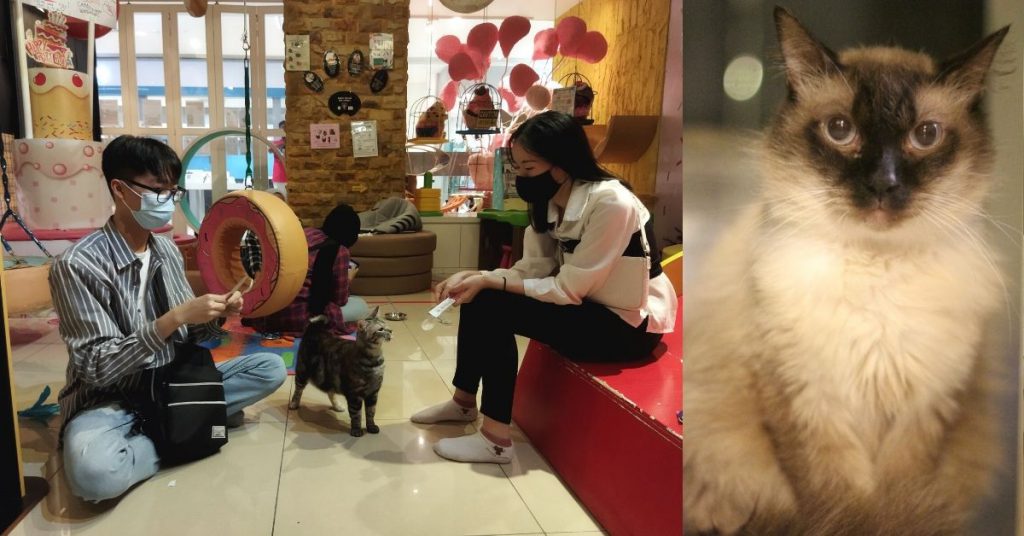Animals are pets to many, and therapy to some. You may have come across people with emotional support animals before, which is a pet that’s prescribed by licensed mental health professionals to people with disabling mental illnesses.
Besides emotional support animals, there are also assisted therapy places with animals that cater to those with specific mental and physical health needs. In Malaysia, we’ve got Dr Dog, an animal-assisted therapy (AAT) programme, and Petpositive, an AAT organisation, to name a few.
What one would notice with a lot of AAT programmes, however, is that dogs are usually the animals used. On the other hand, while this cat haven in KL’s concrete jungle doesn’t claim that its felines are trained in AAT, it seeks to serve a similar purpose.
Not quite a pet cafe
At C-A-T Playground, you would find a place that offers emotional support and claims to help with physical development and sensory needs. In general, it was designed with the needs of children who have autism, Down syndrome, speech delays, cerebral palsy, and ADHD in mind.
“Most of the playgrounds are overloaded with sensory inputs that are very difficult to be managed by someone with special needs, who most of the time suffer from sensory processing issues,” shared Dr Khew, founder of the playground.
Dr Khew himself has a doctorate in animal behaviour, specifically in the field of human-pet relations, and opened the playground in 2018 after years of research, planning, and conceptualisation.
The touch of a cat’s love
Prior to C-A-T Playground, Dr Khew had opened Country Cat Cafe back in 2014. It was one of the earliest cat cafes to open in Malaysia, and it was there that Dr Khew witnessed the therapeutic power of having a safe space to play with felines.
As more cat cafes began cropping up, Dr Khew noticed that most of them were made mainly for fun and profit-making, which he didn’t quite agree with.
Hence he moved on and came up with the idea of a playground that could help educate the public about special needs awareness. He was invested enough in the idea that he put in RM200K as initial capital.
In the playground, felines aside, you’ll find playground equipment, toys and accessories to interact with the cats, and a calming area with a sensory relaxing setup.
But visitors aren’t the only ones who get to have some fun, as the playground also has running wheels, climbing walls, food mazes, and hammocks for the cats to enjoy. Since it’s a playground for cats too, visitors can bring their own well-behaved cats to play in the area as well.
The entry fee to their cat cafe is RM15 for one hour of playtime, which is within the range of most cat cafes that can cost between RM7 to RM18 for a half-hour or the first hour of your visit.
More than just a playground, however, the place also serves as a centre where autism-focused and sensory-based therapy programmes are planned by professional occupational therapists, and held by certified physiotherapists.
Parents can opt to send their kids for a variety of programmes which cost between RM315 to RM735 monthly, depending on the number of 90-minute sessions per week.
Meet the kitties
As of now, the playground houses 11 cats, most of whom were rescued and some who were fostered. The playground is not a shelter though, and only takes in cats after they’re monitored for their behaviour.
Though children with mental disabilities are their target market, young working adults and families tend to be the ones who frequent their playground most, Dr Khew observed.
“Families who come will bring along their young children, which we encourage as the interaction with animals can help build a more loving and caring behaviour in our young ones,” he explained.
This is a sentiment shared by Farm In The City founder, Dato Allan Phoon, whose very reason for opening the petting zoo was so he could help children and their families cultivate a sense of familiarity and affection for animals.
Pre-MCO, the playground was earning an average revenue of RM10K-12K per month, and on good months it could go up to RM15K. But Dr Khew clarified that profits were not their main focus.
“It’s not a profit-making project. We are doing this to help the community so that there’ll be a general place where people with mental disabilities can visit, and everyone else too.”
However, since the beginning of the pandemic last year, they’ve been experiencing drastic losses and have had to shoulder the playground’s costs out of their own pockets.
“All the overheads, such as rent, salary, utilities, food, and medical bills all added up is a big monthly cost altogether,” Dr Khew said. And with movement restrictions, they’re seeing pretty much zero income each day.
Now, the team has now turned to social media and crowdfunding sites to ask for help, as the debts and costs have been getting more overwhelming. They recently closed some funding campaigns to raise RM10K and RM8K, but with 11 cats and a team to care for, these funds will run out fast.
At times like this, it’s hard for a niche business like this to thrive seeing how it can’t provide its services effectively in a remote manner to its target audience.
While crowdfunding could cushion the pandemic’s blow for them a bit, for some extra income, C-A-T Playground could consider partnering or outsourcing their cats to counselling or therapy centres that are interested in incorporating animals in their services too.
At the very least, the cats’ welfare would be assured, and the team can focus on managing its own burdens.
- You can learn more about C-A-T Playground here.
- You can read more about other Malaysian startups we’ve written here.
Featured Image Credit: Dr Khew, founder of C-A-T Playground
